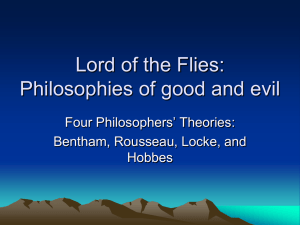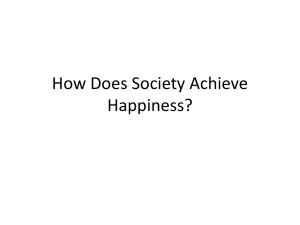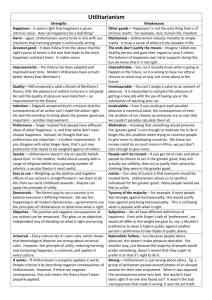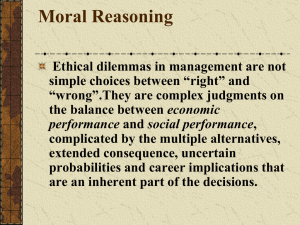Plato`s Metaphysics
advertisement
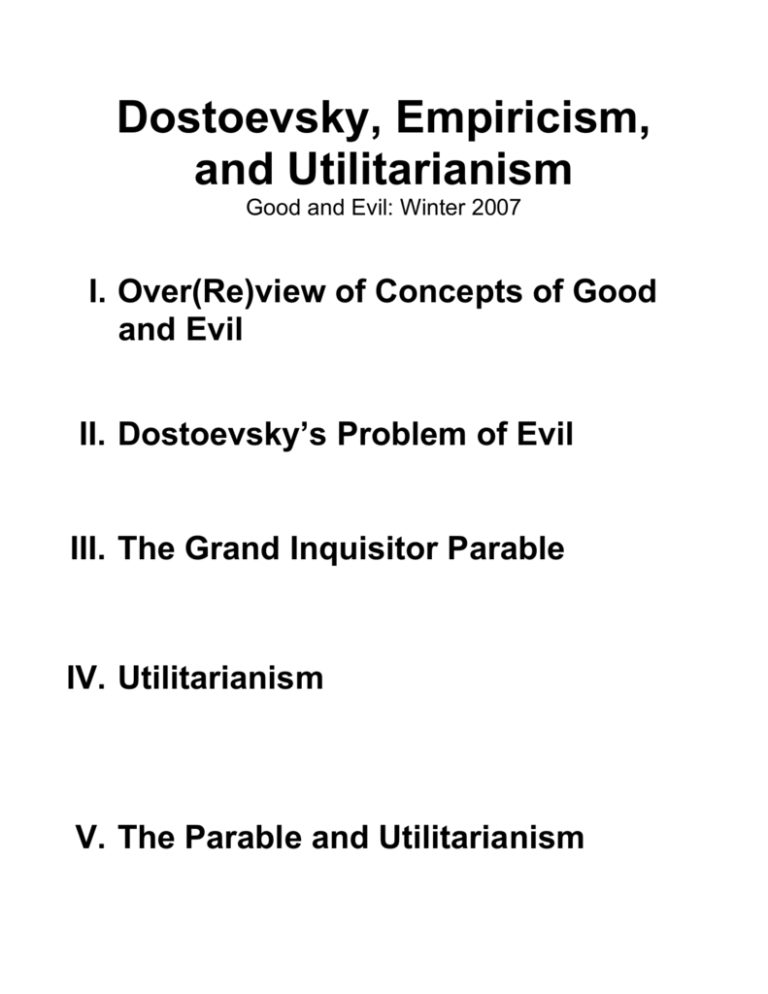
Dostoevsky, Empiricism, and Utilitarianism Good and Evil: Winter 2007 I. Over(Re)view of Concepts of Good and Evil II. Dostoevsky’s Problem of Evil III. The Grand Inquisitor Parable IV. Utilitarianism V. The Parable and Utilitarianism I. Over(Re)view of Good and Evil A. Plato: Good and Evil are both Natural and Moral. Good is an independent, objective Form. Evil is extreme imperfection of that Form. B. Voltaire: Good and Evil are not Natural. Good and Evil in the world are beyond our comprehension. C. Kant: Good & Evil are Moral only. Good applies to a good will — a will to do one’s duty as recognized by reason. Evil applies to a will that acts from inclination not duty. II. Ivan’s (Dostoevsky’s) Problem of Evil Either God exists or He doesn’t. A. Ivan’s Theistic Argument. 1) Suppose an omnipotent God exists. 2) There is evil in the world. 3) Either God cannot prevent evil, or He does not want to prevent evil. 4) If God cannot prevent evil, then He is not omnipotent. 5) Therefore, God can prevent evil. [1, 4] 6) Therefore, God does not want to prevent evil. [3, 5] 7) Therefore, God is not benevolent but cruel. [6] 8) Therefore, the world is intolerable. [7] B. Ivan’s “Atheistic” Argument 1) Suppose God does not exist. 2) Therefore, the universe is nothing but matter in causal interaction. 3) If the universe is nothing but matter in causal interaction, then people are causally determined to act as they do. 4) If people are causally determined to act as they do, then: a) no one is responsible for anything they do; b) ethical concepts (good, bad, evil, right, wrong) are mere human inventions. 5) There is suffering in the world. 6) Therefore, no one is responsible for suffering. [4a, 5] Further: 7) Only ethical concepts can give meaning to suffering. 8) Therefore, suffering has no meaning. [4b, 7] 9) Therefore, there is meaningless suffering in the world. [5, 8] 10) If there is meaningless suffering in the world, then the world is intolerable. 11) Therefore, the world is intolerable. [9, 11] III. The Grand Inquisitor Parable. The Grand Inquisitor vs. Christ: Multiple Valid Readings Catholicism vs. Protestantism Western (Roman Catholic) Church vs. Eastern (Orthodox) Church Atheism vs. Theism Utilitarianism vs. Kantianism III. Utilitarianism. A theory of ethics — an account of what makes an action morally right. The Principle of Utility: An act, A, is morally right = A is the act, of all available alternatives, that brings about the greatest net happiness (total happiness less total unhappiness) for all. Questions about Utilitarianism: How are happiness and unhappiness defined? Three views: o Pleasure vs. Pain (Hedonism — Bentham) o Satisfied vs. Frustrated Preferences o A List of Objective Qualities (e.g., health) How are pleasure & pain measured? Bentham had seven criteria by which pleasures and pains can be measured: o intensity o duration o probability o nearness in time o fecundity (does a pleasure lead to later pleasures? e.g., reading philosophy) o purity (does a pleasure lead to later pain? e.g., overindulging) Further Points about Utilitarianism In Utilitarianism, each one’s pleasure and pain count equally to each other one’s pleasure and pain. No one counts more than anyone else. Utilitarianism includes all people, and in fact, all sentient beings. (Bentham: “The question is not, Can they reason? nor, Can they talk? but, Can they suffer?”) Utilitarianism is only concerned with the consequences of actions — not with whether they follow a rule or obey God. Utilitarian is intended to be empirical. The Empiricism of Utilitarianism. Empiricism: The theory that all knowledge is ultimately founded in nothing but sensory experience. Bentham’s Psychology: “Nature has placed mankind under the governance of two sovereign masters, pain and pleasure. It is for them alone to point out what we ought to do, as well as to determine what we shall do. On the one hand the standard of right and wrong, on the other the chain of causes and effects, are fastened to their throne. They govern us in all that we do, in all we say, in all we think….” Bentham’s Account of Human Motivation = determinist, hedonic — no room for freedom Bentham’s Account of Pleasure = Empirical (sensory, measurable, perhaps even publicly discernible) Utilitarianism is based on an empirical psychology (an account of motivation), and Utilitarianism is such that it is (in principle) empirically verifiable whether a person is doing the right or wrong act, according to the Principle of Utility. An Objection and Reply: Objection: It is too impractical to calculate the consequences of one’s actions when deciding what to do. Reply: There is no need for the common folk to do so: Government officials can calculate consequences when making laws and regulations; common folk only need to follow them. The precepts of common morality (don’t lie, don’t cheat, etc.) are good enough guides for most situations. Consequence: “Government House” Utilitarianism —Totalitarianism? “Common folk” get one set of moral rules “The elect” are the only ones who know The Principle of Utility — they are to … o … follow it themselves, and o … construct rules and systems for the common folk, so that they will be guided by it unconsciously Bentham’s Panopticon Panopticon: The “View from Inside” The Inquisitor and Utilitarianism Ivan’s Inquisitor… Utilitarianism… … rejects freedom …accepts determinism … praises bread (=pleasure) as motive …accepts pleasure as motive … justifies actions only on a worldly basis … justifies actions only on empirical grounds Ivan’s Jesus… Kantianism… … represents human freedom …gives a central role to human freedom …represents human dignity …represents human dignity as reason Some Questions: Is there room for concepts of good and evil in an empiricist account of the world? Is there room for ethics within an empiricist account of the world? (If we’re all determined to act as we do, doesn’t that make ethics irrelevant?) Is there room for meaning in life and the world, within an empiricist account of the world? The Same Questions, Reversed: What must be true of the world if we are going to be able to make any sense of … concepts of good and evil ethics meaning in life and the world?

